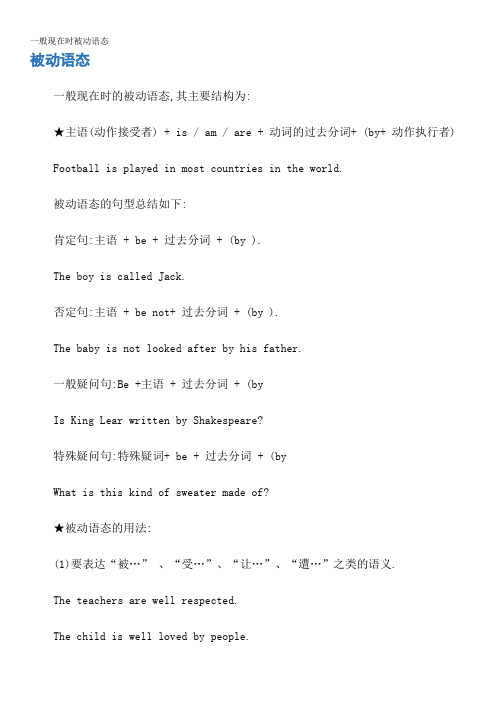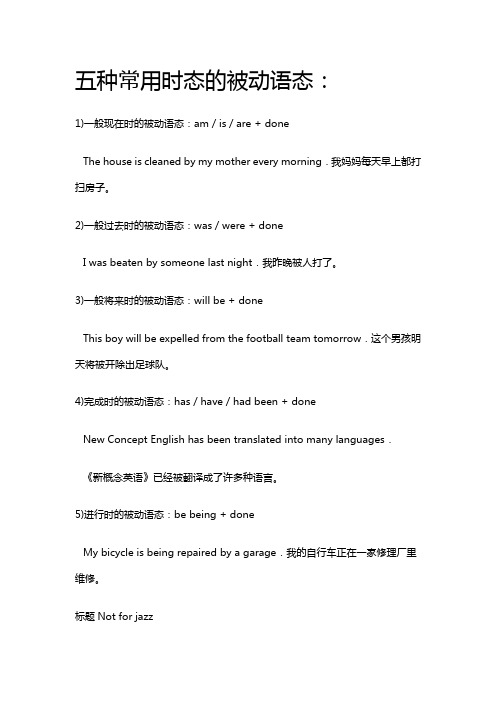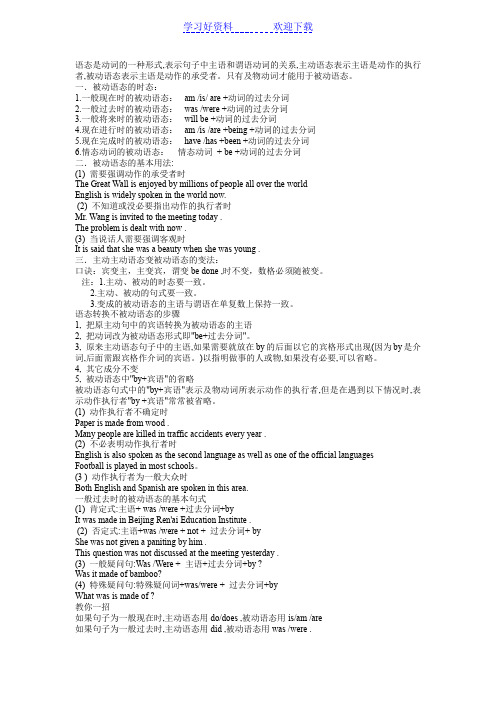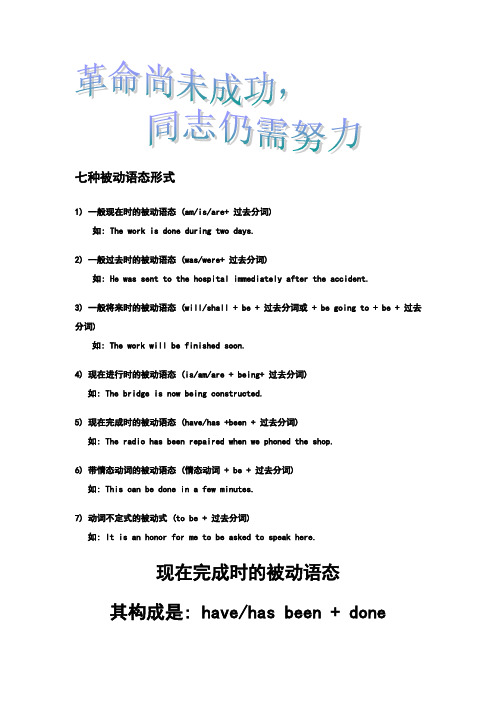一般现在时的被动语态
一般现在时被动语态

被动语态一般现在时的被动语态,其主要结构为:★主语(动作接受者) + is / am / are + 动词的过去分词+ (by+ 动作执行者) Football is played in most countries in the world.被动语态的句型总结如下:肯定句:主语 + be + 过去分词 + (by ).The boy is called Jack.否定句:主语 + be not+ 过去分词 + (by ).The baby is not looked after by his father.一般疑问句:Be +主语 + 过去分词 + (byIs King Lear written by Shakespeare?特殊疑问句:特殊疑词+ be + 过去分词 + (byWhat is this kind of sweater made of?★被动语态的用法:(1)要表达“被…” 、“受…”、“让…”、“遭…”之类的语义.The teachers are well respected.The child is well loved by people.(2)强调动作承受者.He is known far and wide.他远近闻名.(3)不知道式没有必要指出动作的执行者.The room is cleaned every day.房子每天都有人打扫.(4)为礼貌起见避免提及动作执行者.I wonder if I was allowed to introduce myself?我是否可以做自我介绍?【练习】I.选择1. The streets ______ many times every day.A. cleanB. cleansC. cleanedD. are cleaned2. The music is very loud and it can ______ from a long way away.A. be heardB. is heardC. hearD. heard3. Mr. Smith has a loud voice. His voice can ______ clearly even in that big classroom.A. hearB. be heardC. be hearingD. have heard4. —Now computers ______ everywhere.—I agree with you. I think they are the most useful inventions in the world.A. are usingB. useC. are usedD. will use5.The whole China ______ to tears by Cairen Danzhou(才仁旦舟), the youngest volunteer and hero in Yushu,Qinghai Province.A. moveB. movesC. is movingD. is moved6. It is true that knowledge ______ instead of being taught. A. learns B. learned C. is learned D. was learned7. These photos ______ on the Great Wall last week.A. were takenB. tookC. takeD. are taken8. —Can you read this letter for me?—Sorry. It ______ in French. I can’t read it.A. writesB. wroteC. is writtenD. is writing9. Our school ______ 20 years ago.A. built B. builds C. is built D. was built10. A talk on the history of the Great Wall ______ in the school hall next week.A. givesB. gaveC. will be givenD. is givenII.用括号中所给动词的适当形式填空。
一般现在时的被动语态知识点

一般现在时的被动语态知识点一、一般现在时被动语态的构成。
1. 肯定句。
- 结构为“am/is/are+过去分词”。
- 例如:- The book is written by him.(这本书是他写的。
)其中,the book是主语,is written是一般现在时的被动语态结构,write的过去分词是written,by him表示动作的执行者。
- I am often asked to help others.(我经常被要求去帮助别人。
)这里,I 是主语,am asked是被动语态结构,ask的过去分词是asked。
- They are given a lot of homework every day.(他们每天被布置很多家庭作业。
)they是主语,are given是被动语态结构,give的过去分词是given。
2. 否定句。
- 结构为“am/is/are + not+过去分词”。
- 例如:- The window isn't broken by the boy.(窗户不是那个男孩打破的。
)- I am not told the news.(我没有被告知这个消息。
)- They are not allowed to go out at night.(他们不被允许在晚上出去。
)3. 一般疑问句。
- 结构为“Am/Is/Are+主语+过去分词+(by...)?”- 例如:- Is the letter sent by her?(这封信是她寄的吗?)- Are you often invited to the party?(你经常被邀请参加聚会吗?)- Am I given a chance?(我被给予一个机会吗?)4. 特殊疑问句。
- 结构为“特殊疑问词+am/is/are+主语+过去分词+(by...)?”- 例如:- What is made in this factory?(这个工厂生产什么?)- Who are you taught by?(谁教你们?)- How is the work done?(这项工作是如何完成的?)二、一般现在时被动语态的用法。
五种常用时态的被动语态

五种常用时态的被动语态:1)一般现在时的被动语态:am/is/are + doneThe house is cleaned by my mother every morning.我妈妈每天早上都打扫房子。
2)一般过去时的被动语态:was/were + doneI was beaten by someone last night.我昨晚被人打了。
3)一般将来时的被动语态:will be + doneThis boy will be expelled from the football team tomorrow.这个男孩明天将被开除出足球队。
4)完成时的被动语态:has/have/had been + doneNew Concept English has been translated into many languages.《新概念英语》已经被翻译成了许多种语言。
5)进行时的被动语态:be being + doneMy bicycle is being repaired by a garage.我的自行车正在一家修理厂里维修。
标题Not for jazz总结for的用法:1)为:I bought a book for you.我为你买了一本书。
2)因为:Something fell in,for I heard a splash.一定有东西掉下去了,因为我听见扑通一声。
4)适合:Not for jazz=It's not suitable to play jazz on the clavichord.古钢琴不适合演奏爵士乐。
Question:What happened to the clavichord?to后面加宾语,表示其身上发生了什么事,即动作的目标、对象。
What happened to you?你怎么了?(在你身上发生了什么事?)(1)否定句与疑问句的被动语态We don’t believe her.我们不信她的话。
一般现在时被动语态

一般现在时被动语态的构成
第二章
动词be的现在时形式
一般现在时被动语 态的构成:be + 动词的过去分词
be的形式:am、 is、are
be的用法:表示 存在、状态或关系
be的变化规则: 根据主语的人称和 数进行变化
动词的过去分词形式
构成:动词的过 去分词形式是构 成一般现在时被 动语态的关键部 分,通常以“ed”或“-d”结 尾。
变化规则:动词 的过去分词形式 变化规则可以根 据不同的情况进 行分类,如规则 动词和不规则动 词等。
注意事项:在使 用动词的过去分 词形式时,需要 注意其时态和语 态的正确性,以 避免出现语法错 误。
与现在分词形式 的区别:动词的 过去分词形式与 现在分词形式虽 然相似,但存在 明显的区别,如 用法和含义等方 面的不同。
一般现在时被动语态的注意 事项
第六章
注意时态一致性
确保主句和从句时态一致 避免使用不合适的时态 注意时态的正确表达方式 掌握时态转换规则
注意语态使用得当
避免使用过多 被动语态,影 响句子的自然
流畅。
注意被动语态 与主动语态的 转换,保持句
子的平衡。
注意被动语态 的主语选择, 确保句子逻辑
合理。
一般现在时被动语 态
XX,a click to unlimited possibilities
汇报人:XX
目录
CONTENTS
01 一般现在时被动语态的定义 02 一般现在时被动语态的构成 03 一般现在时被动语态的用法 04 与一般现在时主动语态的比较 05 一般现在时被动语态的特殊用法
06 一般现在时被动语态的注意事项
添加项标题
使用被动语态可以让句子更加简洁明了,避免使用不必要的代 词或修饰语,使句子更加清晰易懂。
(完整版)一般现在时的被动语态(否定句)

(完整版)一般现在时的被动语态(否定句)
介绍
一般现在时的被动语态用于描述动作的承受者,而不强调动作
的执行者。
在否定句中,我们使用助动词"be"的否定形式"am/are/is not"加上动词的过去分词形式来构成被动语态。
构成
否定句的一般现在时被动语态的构成形式如下:
主语 + 助动词 "am/are/is not" + 过去分词形式的动词
例子
以下是一些例子,展示了一般现在时被动语态在否定句中的使用:
1. The report is not written by me.(这份报告不是由我写的。
)
2. The cake is not made by her.(这个蛋糕不是她做的。
)
3. The document is not signed by the manager.(这份文件不是经
理签署的。
)
4. The problem is not solved by the team.(这个问题不是团队解决的。
)
注意事项
在一般现在时的被动语态中,动词的过去分词形式不随主语的单复数而变化。
助动词"be"的形式根据主语的单复数以及第三人称的情况而定。
总结
一般现在时的被动语态在否定句中的构成形式为主语 + 助动词"am/are/is not" + 过去分词形式的动词。
使用被动语态可以突出动作的承受者,而不是执行者。
在使用时要注意不同主语的单复数和第三人称的变化。
以上是对一般现在时的被动语态在否定句中的简要介绍。
一般现在时的被动语态

例题解析:
1.They sell the fridge at a low price.
step:1 主语 谓语 宾语
step2:找出谓语 动词的过去式及过 去分词:sell-soldsold
step3:将主动语态 改为被动语态
The fridge is sold by them at a low price
We are advised not to go out alone by our parents.
一般现在时态被动语 态结构: am/is/are+done
Thanks for listening!
Байду номын сангаас
微课
一般现在时态的被 动语态
一般现在时的被动语态 (Passive Voice)
结构: am / are / is +动词的过去分词
主动句变为被动句所遵循的4个步骤:
1. 把原主动句中的宾语变为被动句的主语。
2. 把动词变为被动形式即be+过去分词,并注意其人称和数随主语的变 而变化。 3. 原主动句的主语如需要则放在by后面以它的宾格形式出现(注: 不需要则可省略)
一般现在时态被动语 态结构: am/is/are+done
2、Our parents advise us not to go out alone.
step:1 主语
谓语 宾语
step2:找出谓语 动词的过去式及过 去分词:adviseadvised-advised
step3:将主动语态 改为被动语态
将下列句子变为被动语态

语态是动词的一种形式,表示句子中主语和谓语动词的关系,主动语态表示主语是动作的执行者,被动语态表示主语是动作的承受者。
只有及物动词才能用于被动语态。
一.被动语态的时态:1.一般现在时的被动语态:am /is/ are +动词的过去分词2.一般过去时的被动语态:was /were +动词的过去分词3.一般将来时的被动语态:will be +动词的过去分词4.现在进行时的被动语态:am /is /are +being +动词的过去分词5.现在完成时的被动语态:have /has +been +动词的过去分词6.情态动词的被动语态:情态动词+ be +动词的过去分词二.被动语态的基本用法:(1) 需要强调动作的承受者时The Great Wall is enjoyed by millions of people all over the worldEnglish is widely spoken in the world now.(2) 不知道或没必要指出动作的执行者时Mr. Wang is invited to the meeting today .The problem is dealt with now .(3) 当说话人需要强调客观时It is said that she was a beauty when she was young .三.主动主动语态变被动语态的变法:口诀:宾变主,主变宾,谓变be done ,时不变,数格必须随被变。
注:1.主动、被动的时态要一致。
2.主动、被动的句式要一致。
3.变成的被动语态的主语与谓语在单复数上保持一致。
语态转换不被动语态的步骤1, 把原主动句中的宾语转换为被动语态的主语2, 把动词改为被动语态形式即"be+过去分词"。
3, 原来主动语态句子中的主语,如果需要就放在by的后面以它的宾格形式出现(因为by是介词,后面需跟宾格作介词的宾语。
七种被动语态形式

七种被动语态形式1) 一般现在时的被动语态 (am/is/are+ 过去分词)如: The work is done during two days.2) 一般过去时的被动语态 (was/were+ 过去分词)如: He was sent to the hospital immediately after the accident.3) 一般将来时的被动语态 (will/shall + be + 过去分词或 + be going to + be + 过去分词)如: The work will be finished soon.4) 现在进行时的被动语态 (is/am/are + being+ 过去分词)如: The bridge is now being constructed.5) 现在完成时的被动语态 (have/has +been + 过去分词)如: The radio has been repaired when we phoned the shop.6) 带情态动词的被动语态 (情态动词 + be + 过去分词)如: This can be done in a few minutes.7) 动词不定式的被动式 (to be + 过去分词)如: It is an honor for me to be asked to speak here.现在完成时的被动语态其构成是: have/has been + done现在完成时的被动语态表示动作发生在过去, 到现在已经完成或对现在仍有影响,。
如:1. The dirty clothes have been washed.脏衣服都已经洗了。
2. The plan has been studied by the experts for three times.这项计划已经由专家研究过三次了。
现在完成时:表示从过去持续到现在,还可能继续持续下去的动作,往往和表示一段时间的状语(for+一段时间, since…, )等连用,或用于how long 句型中1. 主语是行为动作的承受者。
- 1、下载文档前请自行甄别文档内容的完整性,平台不提供额外的编辑、内容补充、找答案等附加服务。
- 2、"仅部分预览"的文档,不可在线预览部分如存在完整性等问题,可反馈申请退款(可完整预览的文档不适用该条件!)。
- 3、如文档侵犯您的权益,请联系客服反馈,我们会尽快为您处理(人工客服工作时间:9:00-18:30)。
哈哈,终于抓 住这只小胖子 了!
好奇怪啊!又 梦见自己被灰 太狼抓住了!
The wolf 主
catches the sheep today 谓 宾(承受者)
The sheep is caught by the wolf
today.
被动语态(The Passive Voice):
1)主动语态和被动语态:
2. They don’t speak English.
3. We respect our teachers well.
Hale Waihona Puke 4. We clean our room every day.
5. The students plant many trees every year. 6. Father often looks after his baby.
5. The students plant many trees every year.
Many trees are planted by the students every year.
6. The father often looks after his baby.
His baby is often looked by the father.
• English isn’t spoken by them.
3. We respect our teachers well.
• Our teachers are respected well by them.
4. We clean our room every day.
Our room is cleaned by us every day.
英语动词有两种语态,即主动语态(The Active Voice)和被动语态(The Passive Voice)。主动语态表示主语是动作的执行者, 被动语态表示主语动作的承受者。如: Many students study English.(主动语态) English is studied by many students.(被动语态)
7. They don’t grow rice in spring.
8. He builds a lot of houses every month.
Check your answers:
1.They speaks English.
• English is spoken by them.
2.They don’t speak English.
(3)疑问形式 The child loves this song. This song is loved by the child.
Is this song loved by the child ? Yes, it is No, it isn’t
被动语态的肯定结构: 主语+be + v. pp + (by---)
7. They don’t grow rice in spring.
Rice isn’t grown (by them) in spring.
8. He builds a lot of houses every month.
A lot of houses are built (by him) every month.
I 认识被动语态 (1)肯定形式 The child loves this song.
This song is loved
by the child
• Jane looks after the cat. The cat is look ed after by Jane.
• Children love these songs. These songs are loved by Children 被动语态的肯定结构: 主语+be + v. pp + (by---)
一般现在时态的被动语态
一般现在时态
一、定义:表示经常发生的事情或经常存在 的状态
二、结构:主语+do/does+其它
三、否定句:主语+don’t/doesn’t+V原形+ 其它 一般疑问句:Do/Does+主语+V原形+ 其它
1.I often _____ (go) to school by bike. 2. She usually _____ (get) up at 6 o’clock. 3.___ you ____ (do) homework every day. 4.Lucy ____ (not) do her homework every day. 5. We sometimes ____ (wash) clothes on Sundays.
(动作承受者)
(2) 否定形式 • The child doesn’t love this song. This song is not loved by the child
• They don’t plant the trees The trees are not planted by them 被动语态的肯定结构: 主语+be + v. pp + (by---) 被动语态的否定结构: 主语+be + not + v. pp + (by---)
被动语态的否定结构: 主语+be + not + v. pp + (by---) 被动语态的疑问结构: be+主语+ v. pp + (by---) 回答: Yes, 主语(代词)+ be No, 主语(代词)+ be not
巩固训练.
将下面句子变成被动句.
1. They speaks English.
